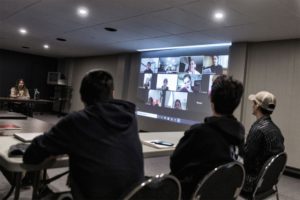20 Indigenous students in Canada’s north recently took part in a four-month online transition program through Camosun College. The program aims to prepare students for post-secondary and to help with a transition that meets their cultural and educational needs. When the students completed the program, at the end of July, they then had an option to transition to in-person learning in the college’s new Kinesiology diploma program in September.
Camosun Centre for Sport and Exercise Education dean Richard Stride says that upgrading in English, math, and biology—which are all pre-requisites for for the Kinesiology program—also opens many other doors—such as Criminal Justice, Indigenous Studies, and Engineering—for students.
“An interesting development with the students as they’ve taken the courses is that the upgrading that they’ve had has also opened doors to several other programs at the college, as well,” says Stride, “and so all of the students came into it with the knowledge that it was a pathway into Kinesiology… It has, in fact, formed a pathway into many other programs.”

Stride says that while the college had a particular intent in mind with kinesiology, reconciliation within an access institution means listening to what the needs of the Indigenous students are.
“We as an institution do a very good job of helping people who have, perhaps, a lot of barriers to post-secondary education feel that they can be successful and belong in the community… I think post-secondary can be very daunting for a lot of people,” says Stride. “They might not have had a lot of success in high school, and they’re looking at post-secondary as being elite and out of reach… We’re able to take away a lot of those fears by giving people good experiences that show them that, yeah, they absolutely can learn and be successful.”
The college’s aim is opening doors and changing lives for people in a way that post-secondary programming can’t always do; Camosun Centre for Sport and Exercise Education associate dean Steven Rumpel says that Camosun is looking to stay consistent with its role as a community college.
“We’re looking for that access to funnel through all possible pathways and channels that provide students the opportunity to participate in post-secondary studies in a way that is meaningful for their goals and their life,” says Rumpel.
The partnership is led by Northern Compass and is a collaboration between Northern Loco, Northern Youth Abroad, and Camosun. While the program is remote, Stride says that there are people on the ground to assist students; he says that’s part of ensuring the success of partnership programs like this one.
“Yes, the courses were online, but there were also people there to help support the students with the technology, help support students with time management,” says Stride. “With our own offerings across the board at the college, I think students will find that there are a lot more options than there had been prior to COVID.”
